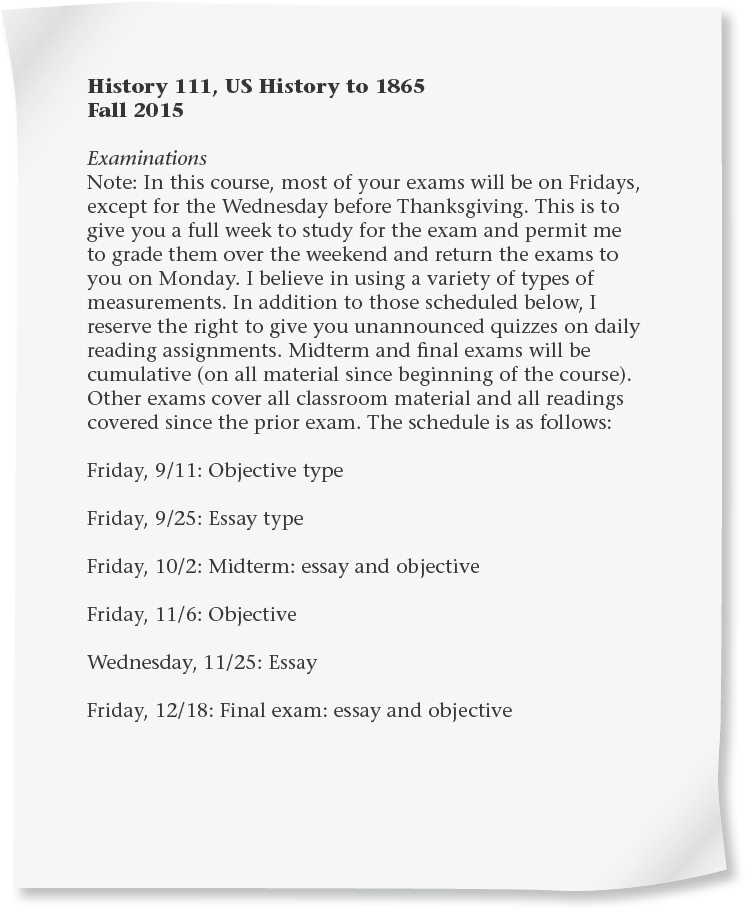Prepare for Test Taking
Tests are usually a major portion of your grade in college, so proper preparation for them is essential. Of course you need to understand the material, but there are many ways you can prepare for exams in addition to your regular study routines.
Find Out about the Test. Ask your instructor about the test format, how long it will last, and how it will be graded. Find out the types of questions, the content that will be covered, and how much time you will have to complete the exam. Talk with your instructor to clarify any misunderstandings you might have about your reading or lecture notes. A part-time instructor may not have office hours, but you can usually talk to him or her before or after class. Some instructors might let you view copies of old exams so that you can see the types of questions they use. Never miss the last class before an exam; your instructor might take part or all of that class session to summarize and review valuable information.
Design an Exam Plan. Use information about the test as you design an exam plan. Create a schedule that will give you time to review for the exam without waiting until the night before. Develop a to-do list of the major steps you need to take to be ready, and schedule review dates. Be sure that your schedule is flexible enough to allow for unexpected distractions or emergencies. If you are able to schedule your study sessions over several days, your mind will continue to process the information between study sessions, which will help you during the test. Be sure you have read and learned all the material by one week before the exam. That way, you can use the final week to review. In that final week, set aside several one-hour blocks for review and make specific notes on what you plan to do during each hour. Also, let your friends and family know when you have important exams coming up and how that will affect your time with them.

Use Online Quizzing. Many textbooks have Web sites available that offer a number of study tools such as flash cards, videos, or online quizzing. Ask your instructors about these sites and also check the preface of textbooks for information on accessing these sites. You might also use Google to find them.

Join a Study Group. As mentioned in previous chapters, joining a study group is one of the best ways to prepare for exams. Group members can share and review the most important topics, quiz one another on facts and concepts, and gain support from other serious students. Some instructors will provide time in class for the formation of study groups, or you might choose to approach classmates on your own. You can always ask your instructor, academic adviser, or college’s tutoring or learning center to help you find other interested students and decide on guidelines for the group. Study groups can meet throughout the term, or they can just review for midterms or final exams. Group members should prepare questions or discussion points before the group meets. If your study group decides to meet just before exams, allow enough time to share notes and ideas.
Talk to Other Students. Other students, especially those who have taken a course you are currently taking from the same instructor, may be able to give you a good idea of what to expect on tests and exams. If your college is small, you shouldn’t have any trouble finding students who have taken the same courses you are taking now. If you’re at a large college, your instructor may be able to suggest a former student who could serve as a tutor. But keep in mind that your instructor may decide to take a different approach in your class than he or she did in past classes.
Get a Tutor. Most community colleges offer free tutoring services. Ask your academic adviser, counselor, or college learning center about arranging for tutoring. Keep in mind that some of the most successful students seek out tutoring, not just students who are struggling. Most students who receive tutoring do well in their courses. Many academic learning centers employ student tutors (also called peer tutors) who have done well in the same courses you are taking. These students might have some good advice on how to prepare for tests given by particular instructors. If you do well in a particular course, you could eventually become a peer tutor and be paid for your services. Serving as a peer tutor also deepens your own learning and helps you become more successful in your major.